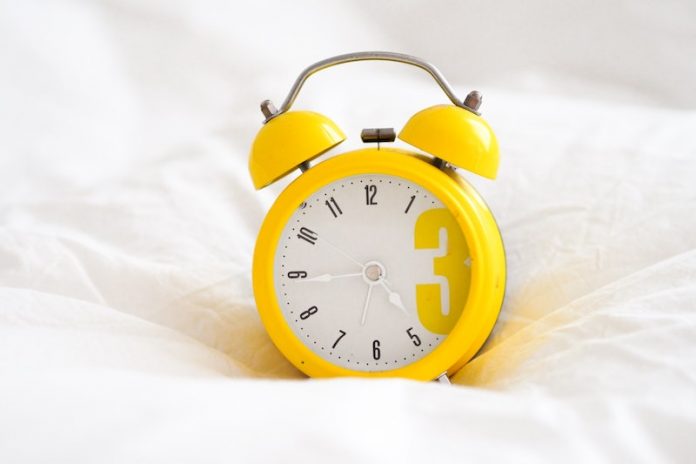
Every spring, the Daylight Saving Time shift robs people of an hour of sleep.
In a new study from Michigan Medicine, researchers found that DNA plays a role in how much the “spring forward” time change affects individuals.
They found people whose genetic profile makes them more likely to be “early birds” the rest of the year can adjust to the time change in a few days.
But those who tend to be “night owls” could take more than a week to get back on track with their sleep schedule.
In the study, the team used data from continuous sleep tracking of 831 doctors in the first year of post-medical school training when the time shift occurred in spring 2019.
From the large UK Biobank dataset, the researchers calculated genomic “chronotype” predisposition information, also known as the Objective Sleep Midpoint polygenic score.
People with low scores were genomically predisposed to be “early birds” and those with high scores were genomic “night owls.”
The team then applied these genomic scores in the intern sample and focused on the two groups of about 130 physicians each that had the strongest tendencies to be “early birds” and “night owls” based on their scores.
In general, the difference in post-DST weekday wakeup times between the two groups was not large—probably because first-year medical residents have very strict work schedules.
But the time they got to sleep on the nights before workdays, and both sleep and wake times on the weekend varied strongly between the two groups. The DST change made the differences even more pronounced.
Early birds had adjusted their sleep times by Tuesday, but night owls were still off track on the following Saturday.
The team says the study gives one more strong reason for abolishing Daylight Saving Time.
It’s already known that DST has effects on rates of heart attacks, motor vehicle accidents, and other incidents.
In the study, the data from direct monitoring and genetic testing allows researchers to directly see the effect, and to see the differences between people with different circadian rhythm tendencies that are influenced by both genes and environment.
To put it plainly, DST makes everything worse for no good reason.
Sleep schedules depend on a combination of many factors—but the fact that people can react so differently to the same abrupt change in time makes it important to study further.
The researchers also looked at the “fall back” time change in autumn and found no big differences between early birds and night owls in how they reacted to the abrupt addition of an hour of sleep.
The findings have implications not just for the annual springtime change, but also for shift workers, travelers across time zones and even people deciding which profession to choose, the researchers note.
The study is published in Scientific Reports. One author of the study is Margit Burmeister, Ph.D.
Copyright © 2021 Knowridge Science Report. All rights reserved.



